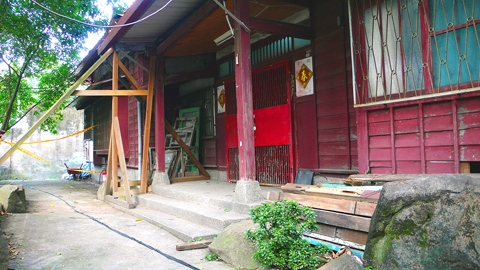The Taipei City Government yesterday started a restoration project on a group of Japanese-style houses built on Qidong Street in the 1920s in an effort to preserve the city’s largest group of such buildings.
The narrow street, located at the intersection of Zhongxiao E Road and Jinshan S Road, has a total of 10 houses built for civil servants during the Japanese colonial era. Occupying more than 6,800m², this kind of architecture has become rare even in Japan, Taipei City’s Department of Cultural Affairs said.
“The wooden structures make the preservation of historical Japanese buildings a challenge, and even in Japan, most old buildings were destroyed or dismantled to make way for urban renewal projects,” Teng Wen-tsung (鄧文宗), a division chief in the department, said during a press conference in front of the houses yesterday.

PHOTO: LIN HSIANG-MEI, TAIPEI TIMES
The area originally comprised 17 houses, but seven were torn down by Bank of Taiwan, which owned the land, in 2002.
To preserve the remaining houses, the government revised regulations in the Cultural Assets Preservation Act (文化資產保存法) and protected the houses as “temporary historical sites” before formally listing them as municipal historical sites in 2004.
Although the 10 remaining houses have been abandoned for years, the interior decorations and a total of 12 old trees are well preserved, Teng said.
The buildings show how people lived during the Japanese colonial era, Teng said.
The restoration project will cost NT$22 million (US$650,000) and will be completed next year.
Chu Chen Pao-kuei (褚陳寶貴), a local resident, said the efforts to preserve the houses were initiated by the local community. The community will cooperate with the department and the Council of Cultural Affairs to preserve the buildings, Chu said.
Lee Yong-ping (李永萍), commissioner of the department, said the restored houses would be open to the public.

Alain Robert, known as the "French Spider-Man," praised Alex Honnold as exceptionally well-prepared after the US climber completed a free solo ascent of Taipei 101 yesterday. Robert said Honnold's ascent of the 508m-tall skyscraper in just more than one-and-a-half hours without using safety ropes or equipment was a remarkable achievement. "This is my life," he said in an interview conducted in French, adding that he liked the feeling of being "on the edge of danger." The 63-year-old Frenchman climbed Taipei 101 using ropes in December 2004, taking about four hours to reach the top. On a one-to-10 scale of difficulty, Robert said Taipei 101

A preclearance service to facilitate entry for people traveling to select airports in Japan would be available from Thursday next week to Feb. 25 at Taiwan Taoyuan International Airport, Taoyuan International Airport Corp (TIAC) said on Tuesday. The service was first made available to Taiwanese travelers throughout the winter vacation of 2024 and during the Lunar New Year holiday. In addition to flights to the Japanese cities of Hakodate, Asahikawa, Akita, Sendai, Niigata, Okayama, Takamatsu, Kumamoto and Kagoshima, the service would be available to travelers to Kobe and Oita. The service can be accessed by passengers of 15 flight routes operated by

Taiwanese and US defense groups are collaborating to introduce deployable, semi-autonomous manufacturing systems for drones and components in a boost to the nation’s supply chain resilience. Taiwan’s G-Tech Optroelectronics Corp subsidiary GTOC and the US’ Aerkomm Inc on Friday announced an agreement with fellow US-based Firestorm Lab to adopt the latter’s xCell, a technology featuring 3D printers fitted in 6.1m container units. The systems enable aerial platforms and parts to be produced in high volumes from dispersed nodes capable of rapid redeployment, to minimize the risk of enemy strikes and to meet field requirements, they said. Firestorm chief technology officer Ian Muceus said

MORE FALL: An investigation into one of Xi’s key cronies, part of a broader ‘anti-corruption’ drive, indicates that he might have a deep distrust in the military, an expert said China’s latest military purge underscores systemic risks in its shift from collective leadership to sole rule under Chinese President Xi Jinping (習近平), and could disrupt its chain of command and military capabilities, a national security official said yesterday. If decisionmaking within the Chinese Communist Party has become “irrational” under one-man rule, the Taiwan Strait and the regional situation must be approached with extreme caution, given unforeseen risks, they added. The anonymous official made the remarks as China’s Central Military Commission Vice Chairman Zhang Youxia (張又俠) and Joint Staff Department Chief of Staff Liu Zhenli (劉振立) were reportedly being investigated for suspected “serious